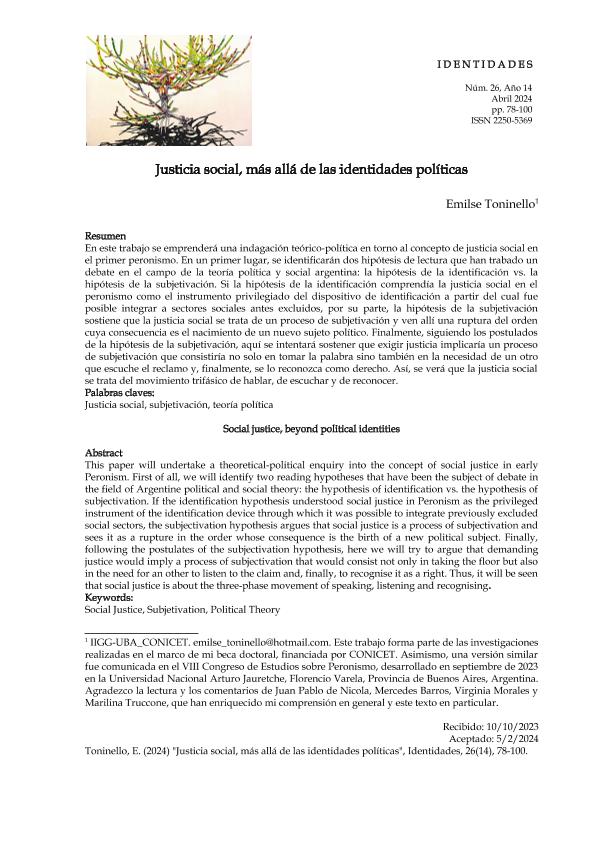Artículo
En este trabajo se emprenderá una indagación teórico-política en torno al concepto de justicia social en el primer peronismo. En un primer lugar, se identificarán dos hipótesis de lectura que han trabado un debate en el campo de la teoría política y social argentina: la hipótesis de la identificación vs. la hipótesis de la subjetivación. Si la hipótesis de la identificación comprendía la justicia social en el peronismo como el instrumento privilegiado del dispositivo de identificación a partir del cual fue posible integrar a sectores sociales antes excluidos, por su parte, la hipótesis de la subjetivación sostiene que la justicia social se trata de un proceso de subjetivación y ven allí una ruptura del orden cuya consecuencia es el nacimiento de un nuevo sujeto político. Finalmente, siguiendo los postulados de la hipótesis de la subjetivación, aquí se intentará sostener que exigir justicia implicaría un proceso de subjetivación que consistiría no solo en tomar la palabra sino también en la necesidad de un otro que escuche el reclamo y, finalmente, se lo reconozca como derecho. Así, se verá que la justicia social se trata del movimiento trifásico de hablar, de escuchar y de reconocer. This paper will undertake a theoretical-political enquiry into the concept of social justice in early Peronism. First of all, we will identify two reading hypotheses that have been the subject of debate in the field of Argentine political and social theory: the hypothesis of identification vs. the hypothesis of subjectivation. If the identification hypothesis understood social justice in Peronism as the privileged instrument of the identification device through which it was possible to integrate previously excluded social sectors, the subjectivation hypothesis argues that social justice is a process of subjectivation and sees it as a rupture in the order whose consequence is the birth of a new political subject. Finally, following the postulates of the subjectivation hypothesis, here we will try to argue that demanding justice would imply a process of subjectivation that would consist not only in taking the floor but also in the need for an other to listen to the claim and, finally, to recognise it as a right. Thus, it will be seen that social justice is about the three-phase movement of speaking, listening and recognising.
Justicia social, más allá de las identidades políticas
Título:
Social justice, beyond political identities
Fecha de publicación:
04/2024
Editorial:
Universidad Nacional de la Patagonia San Juan Bosco. Facultad de Humanidades y Ciencias Sociales. Instituto de Estudios Sociales y Políticos de la Patagonia
Revista:
Identidades
ISSN:
2250-5369
Idioma:
Español
Tipo de recurso:
Artículo publicado
Clasificación temática:
Resumen
Palabras clave:
JUSTICIA SOCIAL
,
SUBJETIVACIÓN
,
TEORÍA POLÍTICA
Archivos asociados
Licencia
Identificadores
Colecciones
Articulos(SEDE CENTRAL)
Articulos de SEDE CENTRAL
Articulos de SEDE CENTRAL
Citación
Toninello, Emilse Mariel; Justicia social, más allá de las identidades políticas; Universidad Nacional de la Patagonia San Juan Bosco. Facultad de Humanidades y Ciencias Sociales. Instituto de Estudios Sociales y Políticos de la Patagonia; Identidades; 26; 4-2024; 60-82
Compartir




